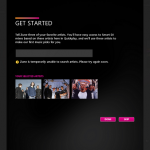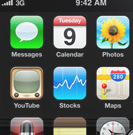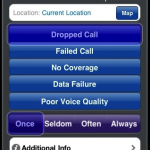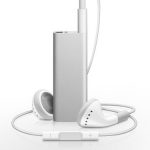Can 'Operation Chokehold' be stopped? Will you join the AT&T DoS?

The strangeness spinning around AT&T's quality of service is starting to make Christmas feel like Halloween. It's scary and tantalizingly inviting to observe. It's like watching a train wreck or freeway pileup in horror and awe. Does Apple have an app for that?
Tomorrow, a service which reliability many customers have questioned, may be intentionally brought down. Whether or not there is any action or even if it fails, everything is different now -- not just for AT&T but any company looking to manage customer relations. The crowd has found a voice. Will the AT&T mob be more American Revolution or French Revolution and its "reign of terror?"
The wireless data paradox: AT&T asks you to use less data

So let me get this straight: AT&T says iPhone users are using too much data. And to ease the resulting strain on its network, the carrier wants to...(ahem)...encourage its customers to throttle back on YouTube, live-streamed radio, and other media-rich apps. A week after playing the good guy with "Mark the Spot," a handy iPhone app that lets users report on coverage dead zones, AT&T is reversing any goodwill gained by warning heavy users they may soon face extra charges for their data gluttony.
Someone please tell me this is little more than a badly thought-out joke.
Microsoft should take Zune to the cloud, offer music for any device

There has been much speculation and punditry about why Apple bought music streaming/sharing service Lala, with cloud services being the biggest reason. I don't agree with this cloudy reasoning, but it got me to thinking that a music cloud service would be helluva good idea for Microsoft -- and the company has been there before.
Apple wasn't motivated to buy Lala to offer cloud services, even though that may eventually be the outcome. As I explained last week, Apple has two conjoined objectives: Thwarting Google competition and improving music discovery. Strangely, Microsoft shares the same reasons and has another: A broken mobile OS/device strategy.
Google, Facebook, and our privacy: We're all in denial

What does it mean to have a "right to privacy?" We have a right to vote, and too few of us use it. I heard it explained to me once, a human right is like a vegetable garden. You have to nurture it, take care of it, and harvest it. Otherwise you have a plot of dirt.
The Internet is not like a vegetable garden. Perhaps that test is appropriate, then, for lawmakers worldwide considering whether the "right to Internet access" follows from the right to free speech -- there are places in the world where is this actively being considered. If a person is denied access to the Internet, the argument goes, her free speech rights are being violated, or at least abridged.
iTunes gets cloudy: Will a web-ified future save iTunes or kill it?

I'm not at all surprised that Apple's recent purchase of Lala Media, a previously-ignored music streaming outfit that likely would have flatlined otherwise, is already generating rumblings of impending major change to one of the most pivotal brands in its arsenal. While it was the iPod and iPhone devices that first established Apple's consumer product cred and later sealed its long-term position on the techno-cultural podium, it was iTunes that turned the process of buying, managing and consuming content from a chaotic mess into something that ultimately killed the local record store and permanently changed the entertainment landscape.
If only the world never changed
iPhone brings back the DOS dilemma

Apple's iPhone is supposed to be about the cool, new mobile Internet future. But using the smartphone reminds me too much of the past. The beautiful, ergonomically-designed iPhone has two related flaws: Fixed battery and prohibited background applications. Apple wrongly chose to put form before function in designing iPhone hardware and software.
The device's related flaws remind me of MS-DOS PCs' 640k memory limit. Microsoft used digital steroids -- extended and expanded memory -- to bulk up MS-DOS. But it was never enough to make up for what memory limitations took away from DOS' performance or stability.
Why Apple succeeds, and always will

Simply put: Apple doesn't play by the rules. It reinvents them. Apple applies what I call "David Thinking" to its broader business, product development and marketing. Apple is David to Microsoft Goliath -- and other ones, too. Goliath plays by one set of rules. David choses to change the rules, which favor his strengths rather than those of Goliath.
David Thinking is most provocative and surprising when Goliath acts like David. After all, David sometimes becomes Goliath; Apple is a giant in music with iPod and iTunes Music Store. But David turned Goliath also risks making mistakes that would allow another upstart advantage. Today, Apple is both David and Goliath, depending on market.
What does AT&T's 'Mark the Spot' app say about service quality?

Do you have AT&T as wireless carrier? Are you happy with the network service quality? I encourage Betanews readers to respond in comments to these questions, which are suddenly surreal now that AT&T has released the "Mark the Spot" app for iPhone. There's something comical about an app that tells AT&T about its connection problems. The app also is tacit admission that AT&T has voice service problems. Surely for some greedy lawyer, there's a lawsuit for that.
Some readers will ask why post a commentary like this one. What's newsie about whacking AT&T aside the head for its well-publicized service problems? Answer: Most of us here -- me writing and you reading -- are gadget freaks. Many American Betanews readers use iPhone, for which there is only one official carrier choice: AT&T. In that context, bad service is a problem. Additionally, it's the holidays, when some people give the gift of phone. Since most dumbphones and smartphones are sold subsidized and locked to a single carrier, network should be considered in any handset purchase.
Nokia, can you please stop kicking yourself in the head?

Nokia has long been one of my favorite tech companies, but recently I started to lose faith in its future. When an enthusiast/fan says something like that, a company either has a serious public image crisis or serious problems. Both situations are about equally bad. I want to believe in Nokia, I really do, but recent events unravel my confidence.
Nokia's fundamental problem is retreat. The company has started to retreat before the great econolypse. Now should be the time for Nokia to make new investments -- in products and research -- not pull back on them. Retreat signals to competitors that there is vulnerability, which also can unravel customers' confidence about buying new products. In October, I switched from AT&T to T-Mobile, because of constantly annoying dropped calls and in preparation for the Nokia N900. T-Mobile service satisfies, but I still haven't bought the N900. I'm too unnerved about Nokia's future and its product and services strategy.
Not the first, not the last, technology predictions for 2010

December never fails to make me cringe. I know full well that journalists will be filling my inbox all month long with countless requests to guess what next year's hot technologies will be.
I can understand why they would. Trying to predict what comes next in tech has always been an important way for businesses and consumers alike to make the right decisions about what to buy -- and what to avoid -- in the months ahead. Like the groundhogs who have been doing something similar for generations, we all want to know what's coming so we can plan more effectively for the future.
Now you can tell Microsoft what to do

Microsoft advertising has people claiming that "Windows 7 was my idea." I'd like to make "my idea" more real for Betanews readers, by offering a soapbox to give Microsoft a piece of your mind (be polite, but firm); first some context on why do it now.
For Microsoft, the New Year really is a new beginning. January 1 marks the half-way point in the company's fiscal year and the period leading into the annual review process. Employee reviews can't be good this year, with Microsoft morale low (or so I've been hearing) following calendar 2009 layoffs.
Microsoft pulls Windows 7 Family Pack, so you can spend more for the holidays

I've got a new spelling for "Scrooge." M-i-c-r-o-s-o-f-t. The company has ended the Windows 7 Family Pack promotion, which is a nice Ba Humbug to you and yours for the holidays. Sure, it could be good for Microsoft's bottom line and perhaps partners' PC sales. But for the masses considering upgrading existing Windows XP/Vista PCs to 7, a good thing is suddenly bad.
Maybe Microsoft executives looked at Apple charging so much for Macs and thought, "Why discount Windows 7?" Perhaps, but generally companies offer greater discounts as the holidays approach, not take them away. Windows 7 Home Premium Family Pack offered three upgrade licenses for the tidy sum of $149.99. Now the upgrade price is $119.99 per license.
Microsoft, don't hang up on Windows Mobile, but do call for help

It hasn't been a good day for anyone working on Microsoft's Windows Phone team. This morning, IDC made the ridiculous prediction that the number of iPhone/iPod touch applications would triple to 300,000 by end of 2010. Later, here at Betanews, Carmi Levy slammed Microsoft's Windows mobile strategy.
Yes, Windows Mobile is down -- really low -- but the operating system isn't bad. The mobile OS is good at the core, meaning the kernel, and multitasks pretty well. It's the user interface and partner model that needs a makeover -- and awfully fast. Microsoft is quickly falling behind Apple and Google, but there's hope. Android is a bigger threat than anything Apple has got, because of competing licensing and partner models. Don't give up, Microsoft, but for frak's sake do get a move on.
See ya later, WinMo: Microsoft's mobile strategy needs a reboot

There are lots of winners in the wireless wars. Microsoft, unfortunately, isn't one of them. Thirteen years after it first introduced Windows CE, its homegrown OS for small devices finds itself perilously close to oblivion. With market share for Windows Mobile OS in freefall, vendors fleeing and its mindshare in meltdown, now is as good a time as any for the company to dive into a full-on re-think of its mobile strategy.
Or an exit from the market until it can figure out what makes the most sense.
The Black Screen Syndrome, or, Tech news in search of the apocalypse

Was the "Black Screen of Death" issue (KSoD) covered by Betanews earlier this week a real story? This is a serious question, especially in the wake of security firm Prevx's admission that it was very premature in its conclusions that KSoD incidents had been triggered by last month's round of Patch Tuesday updates.
Let's discuss this rationally. Although it does not appear to be an exploitable security problem by malicious users, and we have reason to believe it cannot become one, the KSoD problem (differentiated from BSoD, the "Blue Screen of Death," something else entirely) is a strange symptom that has cropped up on some machines over the years -- in our experience, some Vista-based systems. Some. It is a significant enough problem that when Betanews encountered it first-hand last June, and I discovered a way for users to fish themselves out from being stuck with it (without installing any new software), I wrote about it and presented a solution that, at least, worked for me.
Recent Headlines
Most Commented Stories
BetaNews, your source for breaking tech news, reviews, and in-depth reporting since 1998.
© 1998-2025 BetaNews, Inc. All Rights Reserved. About Us - Privacy Policy - Cookie Policy - Sitemap.